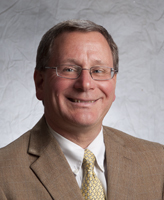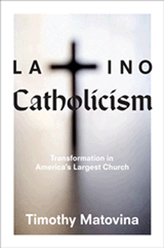
Timothy Matovina, a professor in Notre Dame’s Department of Theology, has won the 2012 College Theology Society Best Book Award for his work Latino Catholicism: Transformation in America’s Largest Church (Princeton University Press, 2011).
Matovina, who specializes in Latino theology and religion, particularly Latino Catholicism, is also executive director of Notre Dame’s Institute for Latino Studies, housed in Notre Dame’s College of Arts and Letters.
“I appreciate receiving this award as a recognition of the growing importance of Latino Catholics in U.S. Church and society,” Matovina says. “It signals that my efforts to examine the struggles and faith of Latino Catholics are shaping the work of important pastoral and theological leaders.”
A Significant History
In his book, Matovina explores the 500-year-long history of Latino Catholics on this continent and how that history, the U.S. Catholic Church, its expanding Latino population, and American culture are now all transforming each other.
“Latinos’ attempts to celebrate their faith and bring it to bear on the everyday realities of their lives have shaped Catholic parishes, apostolic movements, leadership, ministries, worship, social activism, and much more,” Matovina says.

“At the same time, the lives and faith of Latino Catholics are being dramatically refashioned through forces like the multiple pressures of assimilation, the upsurge of Pentecostal and evangelical religion, growing secularization, civil rights struggles, conservative political movements, and ongoing controversies over immigration and clergy sexual abuse.”
The inspiration for his research, Matovina says, came three decades ago when he was participating in a study program in San Antonio at the Mexican American Cultural Center (now the Mexican American Catholic College). While there, he worked specifically with Latino Catholic faith communities.
“Latinos have much to offer U.S. Catholicism,” he notes. “Their youthfulness is a source of revitalization for Catholic faith communities. Their leadership has extended Catholic involvement in faith-based community organizing and activist efforts that expand grassroots participation in civil society. Their ritual and devotional traditions incite embodied prayer and faith.”
A Growing Future
Perhaps most notably, Matovina says, the increased presence of Latino Catholics can be seen in the makeup of congregations across the country, now more diverse than they have been for decades.
When European immigration was at its peak a century ago, he says, parishes across the nation catered to a particular language or cultural group. Over time, suburban parishes became largely made up of the descendants of those immigrants. Now, however, roughly 30 percent have a significant contingent of at least two language or cultural groups.
“The participation and sheer number of Latino parishioners is the leading cause for the ongoing evolution of the U.S. Catholic parish from the ethnic enclave to the multicultural congregation,” Matovina says.
“For good or for ill, intercultural encounters in these parishes alter the day-to-day congregational experience of numerous Catholics, Latinos and non-Latinos alike.”
Learn More >
- Department of Theology
- Timothy Matovina faculty page
- Notre Dame Institute for Latino Studies
- Latino Catholicism: Transformation in America’s Largest Church
- College Theology Society
- Related story: Theologian Timothy Matovina’s Book Explores the Challenge and Blessing of Latino Catholicism
Originally published by at al.nd.edu on January 28, 2013.